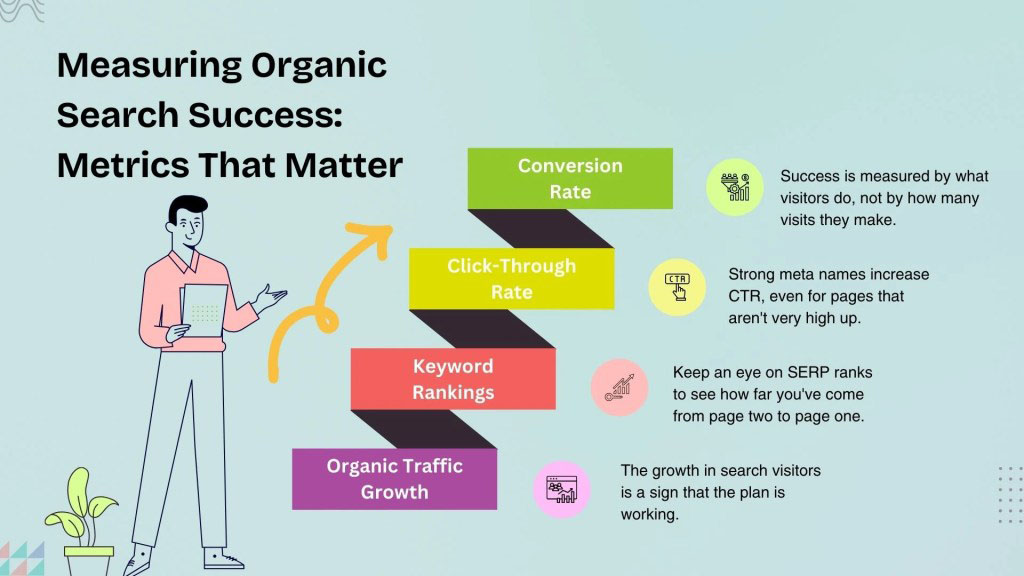Organic search boosts Google’s brand reputation and engagement without expensive advertising. Digital marketers must master organic search to increase brand visibility. Organic search attracts high-intent, ready-to-engage users in a paid marketing and trend-driven environment.
What Is Organic Search and Why Does It Matter?
Organic search refers to the free, natural listings on Google, Bing, or Yahoo’s search engine results pages (SERPs). Unlike paid ads, these results are earned through relevance, quality, and optimization rather than financial investment. For digital marketers, organic search represents a vital opportunity because it draws in users actively seeking solutions, making it a prime channel for driving conversions.
The Power of Organicists Search in Numbers
Statistics highlight the impact of organic search: over 53% of website traffic originates from it, according to BrightEdge. HubSpot data further reveals that organic search leads achieve a 14.6% close rate, far surpassing the 1.7% from outbound efforts. This disparity stems from user perception organic results are viewed as authentic and trustworthy, making them a priority for digital marketing professionals .
Organic Search vs. Paid Search: The Real Difference
Paid search delivers immediate visibility, whereas organic search establishes a lasting foundation. When paid campaigns end, their traffic ceases, but organic rankings persist, providing consistent visitor flow over time. This durability mirrors the difference between short-term gains and long-term value, positioning organic search as a strategic asset.
How Organic Search Works: The Mechanics Unveiled
A clear understanding of organic search mechanics is crucial for digital marketers aiming to optimize it effectively. Sites like Google use complex algorithms to decide how to rank content based on how useful, how reliable, and how simple it is for people to find. The process unfolds in distinct stages.
Crawling and Indexing: The Starting Line
Search engine bots begin by crawling websites scanning pages and links to uncover content. This content is then indexed, stored in a vast database, and made available for retrieval during searches. A site remains invisible to search engines if it isn’t crawlable or indexable. Tools like Google Search Console can ensure pages are properly accessible.
Ranking Factors: What Moves the Needle
Google’s algorithm evaluates over 200 factors, with several playing a pivotal role in organic search success. Relevant keywords aligned with user intent are fundamental, as is high-quality, informative, and engaging content. Backlinks from authoritative sites signal trustworthiness, while user experience encompassing fast load times, mobile-friendliness, and intuitive navigation further influence rankings. Mastery of these elements paves the way to higher SERP positions.
Why Organic Search Is a Must for Digital Marketers

Organic search is more than just a strategy; it helps with bigger goals like building brand recognition, getting new leads, and keeping old customers. Its importance is undeniable for digital marketing professionals.
Sustainable Traffic That Scales
Unlike paid campaigns requiring ongoing resources, organic search offers enduring benefits from a single effort. Once content secures a ranking, it can attract visitors for months or years, making it an efficient approach for sustained growth.
Builds Brand Authority and Trust
High organic rankings convey expertise, as users perceive top results as credible. This perception strengthens a brand’s reputation, fostering loyalty and an invaluable advantage in a competitive digital arena.
Targets High-Intent Audiences
Organic search excels at reaching us, and we are poised to act. Searching for “ best SEO tools for 2025 ” indicates purposeful research, no casual browsing. Ranking for such terms positions a brand to capture leads at critical decision-making moments.
How to Optimize for Organic Search: Actionable Steps

Elevating organic search performance requires proven strategies tailored for digital marketers aiming to secure and maintain top rankings.
Keyword Research: The Foundation of Success
Utilize tools like Ahrefs, SEMrush, or Google Keyword Planner to pinpoint high-volume, low-competition keywords . Long-tail phrases such as “how to improve organic search traffic” that match user intent should be prioritized and integrated naturally into content.
Consider the problems your target customers aim to solve. Keywords should address their questions rather than solely promoting a product, shifting content from promotional to solution-oriented.
Create High-Quality, User-Focused Content
Content reigns supreme when it delivers value. In-depth articles, guides, or case studies that thoroughly address que ies perform best. Longer content, often exceeding 1,500 words, tends to rank higher, according to Backlinko, provided every paragraph contributes meaningfully.
Technical SEO: Don’t Skip the Basics
Even exceptional content falters if a site’s technical foundation is weak. Pages should load in under three seconds, as Google PageSpeed Insights verified. Mobile responsiveness is non-negotiable, given that over 60% of searches occur on mobile devices. Clean, descriptive URLs like “/organic-search-guide” enhance performance over vague alternatives like “/page123.”
Build Backlinks: The Authority Booster
Engage industry blogs, pursue guest posting opportunities, or develop shareable infographics to earn backlinks. Quality outweighs the quantity of links from reputable sources like Forbes or Moz, which carry more significant influence than numerous low-value connections.
Common Organic Search Mistakes to Avoid
Even experienced digital marketers can falter without vigilance. Several pitfalls warrant attention.
Overstuffing Keywords
Excessive keyword repetition is outdated and penalized by Google’s advanced algorithms. Readability and context should take precedence over forced inclusion.
Ignoring User Intent
Ranking for “organic search” is meaningless if the content fails to meet user expectations, such as providing a definition instead of a how-to guide. Misalignment leads to high bounce rates , which undermine rankings.
Neglecting Updates
Search engines prioritize fresh content. A blog from 2020 requires updates with 2025 data and insights to remain competitive.
Measuring Organic Search Success: Metrics That Matter

Evaluating organic search performance hinges on tracking key performance indicators with tools like Google Analytics and Search Console.
Organic Traffic Growth
An increase in search-driven visitors indicates a successful strategy, reflecting steady progress.
Keyword Rankings
Monitoring target terms’ positions on SERPs reveals advancement, with a shift from page two to page one marking significant achievement.
Click-Through Rate (CTR)
Compelling meta titles and descriptions elevate CTR, even for non-top rankings, with 3-5% as a solid target.
Conversion Rate
Traffic alone isn’t enough; conversions determine true success. Engagement, sign-ups, or purchases by organic visitors validate the strategy’s impact.
Organic search demands patience, strategy, and skill, yielding sustained growth, authority, and high-intent audience engagement. It’s a powerful tool that internet marketers can use to get these results quickly. By creating exceptional content, mastering keyword research , and refining technical SEO, organic search becomes a cornerstone of digital success. In a crowded online landscape, the right approach elevates your brand above competitors. Take action today to optimize, and watch organic traffic propel your results tomorrow.



